Woody Allen Vicky Cristina Barcelona Interview
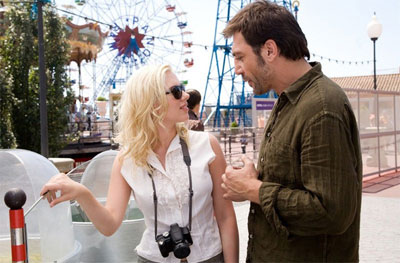
Woody Allen Opens Up
Woody Allen, 'Vicky Cristina Barcelona' Interview by Paul Fischer.Woody Allen is as an iconic director and character as you can get. Filmmaker, author, Oscar winner, clarinet player and former stand up comedian and TV joke writer, the former Alan Konigsberg has evolved as one of the world's preeminent filmmakers. His latest movie, the Barcelona-set comedy/drama 'Vicky Cristina Barcelona, may be his most accomplished work in a decade, dealing with two American women in Barcelona whose fateful meeting with a local artist changes their lives. In Los Angeles to direct an opera, the reclusive but always chatty Mr Allen spent considerable time talking to the media. Paul Fischer, who first met Allen back in the winter of 1980, was there.
Paul Fischer: I'm curious for you to talk about the inspiration you get from women. Can you talk about women and what they bring out in you in terms of making films?
Woody Allen: The interesting thing is, and I've said this before, when I first started I could never write for women. When I wrote my first couple of films and did them, and when I used to write my cabaret act, and I would write sketches for television, I could never write for women. I always wrote the male point of view. This went on and on for quite a while. People even commented about it at the time. Then I got into 'Play it Again, Sam' with Diane Keaton on stage. Keaton and I started dating, we started living together, and became very close. Through some kind of Socratic osmosis or something I started writing for women. I started writing for Diane, and I found I could write for women. Then I sort of only wrote for women. I wrote more and more for women, and I wrote for them all the time. I like women and I enjoy their company. The person I edit with is a woman, my editing assistants are all women, and my press people are all women. My producer is a woman. I just enjoy their company very much. I get a big kick out of them. For some reason I find them interesting to write about too, men occasionally, but really my heart is in it more when I'm writing for women. I don't know why but I remember when that transformation took place from an inability to write a credible woman. I couldn't' write anything but a one-dimensional woman. Then I was writing for women all the time. Over the years I've written many women's roles that turned out to be some of my most interesting roles. A bonus is that there are so many wonderful actresses out there, it's much easier to get a woman for a role, than it is a man. If you write a role there are always a couple of women you can get for it, where as with a guy, if you don't get the one or two guys you want its not so easy. There is a scarcity of guys, really, on that level. There are so many gifted women out there that are just waiting for an opportunity to work.
Paul Fischer: Like Scarlett Johansson?
Woody Allen: Yeah, Scarlett was an accident. I had Kate Winslet for 'Match Point' to the last week in pre-production, when she said she couldn't do the picture, because she had worked continually and had spent no time with her child. She asked would I forgive her, and of course I understood that completely, and I didn't know Scarlett from a hole in the wall. I thought she was too young to play the part. She was only 19 years old at the time. I was in a hole, I had to get somebody fairly quickly, and I knew that Scarlett was a great actress and a beauty. I didn't know if she was really what I had written. I hired her and became totally captivated by her. I thought she could simply do anything. She was not only beautiful but also bright, amusing, charming, and gifted. I'm very happy to work with her. Whenever there is a part that fits anything she could do I would always call her and hope that she would be available for it, as I did with Keaton for years. I did that with Mia [Farrow]. I did many roles with her, thought she was a wonderful actress, and she never let me down. I think that the same with be true with Scarlett.
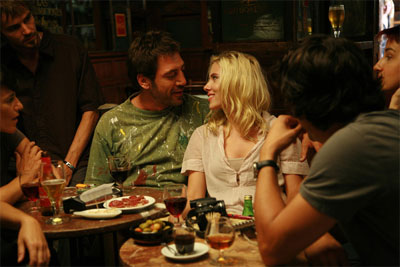 Paul Fischer: As a writer what are the challenges for you to write about three different culturally distinctive characters, in terms of creating the characters? What was a particular challenge for you?
Paul Fischer: As a writer what are the challenges for you to write about three different culturally distinctive characters, in terms of creating the characters? What was a particular challenge for you?Woody Allen: It was not, I had the idea about two women going away on a summer thing some place. Someone called from Barcelona and said 'Would you like to make a picture here? We'll finance it.' That's always the hardest part of making any picture, is getting the financing. Writing it, directing it, or anything else is easier than getting the financing for it, so I said sure, I would do it. I had no idea for anything for it, and then about a week or two later I got a call from Penelope Cruz. I didn't know her, she wanted to meet, and she was in New York. I had only seen her in 'Volver' and nothing else ever. I thought she was great in it, and she said that she knew I was doing a film in Barcelona, and she would like to participate. I started out with Barcelona, with Penelope, and in the back of mind I was going to go to Scarlett. Then I heard Javier [Bardem] was interested, so gradually it took shape. I was writing for these people. I was deliberately writing for these people. I didn't know Rebecca Hall at all. Juliet Taylor, my casting director, discovered her. She said that she was great, I should read her, and look at some film on her. I did and she was right. I put the thing together for the people almost, as I did it, and did the best I could. I relied on whatever knowledge I had, I've been to Barcelona several times in my life, but I didn't have a vast knowledge of it. When I got over there the art director took me to all these places. You get help from people. Everybody on the crew cooperates and says 'They would never speak that way.' Or 'They would never go to this restaurant if they are 25 or 30 years old. They would go to this one.' So gradually you do it and it looks like you know Barcelona, or you know London, when in fact you are faking. Everybody helps you a great deal. That is exactly how it emerged.
Paul Fischer: You have been exploring relationships in all of your films. Have you found any answers?
Woody Allen: I haven't found any answers that you would want to hear. [Laughs] At the end of this movie, it's a very pessimistic movie, because even the cosmetics of the movie are up. Barcelona is beautiful, there is light, the music is pretty, and the actors and actresses are beautiful. In the end Javier and Penelope can't live with each other, they can't live without each other, and they are constantly dissatisfied. They can't make it together. Scarlett is always suffering from chronic dissatisfaction. She wants something but has no idea what it is and she will always want something. She will never know what it is, and nothing will ever satisfy her, because it's really in her. That's the problem. Rebecca Hall is marrying this guy but she'll have a fairly stable, acceptable life, with no big highs or lows, and it will be some version of what Patricia Clarkson has. Maybe less dramatic than that, or more maybe, but she'll always feel that there were missed things in life she didn't have. I have a pessimistic view of relationships. My view has always been that you talk about it with your friends, you scheme, you plot, and you see psychoanalysts. You see marriage counselors, get medicated, do everything they can, but in the end you have to luck out. It's complete and total luck. You have all these exquisite needs, some woman has all her exquisite needs, and the odds of all those wires going together are very, very slim. If one of those wires is not there then it gets annoying and she gets dissatisfied, you get dissatisfied. So, to get it all clicking in is a very happy accident. It does happen to people, because there are so many people in the world, which statistically a certain amount of them luck out. They meet someone, fall in love, they are happy with that person, no real friction, but its luck. This is my observation of it, this can be argued, but if you ask me I would say that's what I've learned. All the advice, planning, self help books, anything you do, dating services, you've got to get lucky. If you do its' great. Some people do, but you can see by the divorce rate, the amount of relationships people go through, and the amount of people in unhappy relationships but stay together because of inertia, because of children, fear of loneliness... there are very few really wonderful ones. You have to get lucky. I hope I haven't depressed you.
 Paul Fischer: When you were shooting you always had a trove of fans. How complicated was it to shoot?
Paul Fischer: When you were shooting you always had a trove of fans. How complicated was it to shoot?Woody Allen: It was very easy to shoot in Barcelona. There is a film community in Spain, some from Barcelona, and some came from Madrid. There is a more active film community there, but it was an cinch. Most of them did not speak English, but a few did. I don't speak Spanish. They knew how to light, they knew how to do all the crew work beautifully. You can see that the picture looks good. The cameraman was a Spanish cameraman, and he did a beautiful job. He was as good as any cameraman in the world, wonderful cameraman, and he didn't speak English. It didn't matter. I've made a number of pictures with a Chinese cameraman who didn't speak any English in the past. I worked for 10 years with Carlos DePalma who spoke a tiny bit of English but not much. Those things are the easy things. That stuff is easy, but what is hard is getting a good script. When a project fails, 90 percent of the time, it's that the script is no good. The actors are generally quite good. It's rare that something doesn't work because the actors have torpedoed you in some way. Its rare that you directed it so badly that it doesn't work. Directing is not rocket science. But if you have a bad script, then no amount of being Fellini, or a great stylist or anything saves you. In the end you have a flawed movie, a boring movie, or illogical story, or un-engaging story. Once I had the script, and it was decent, the fact that nobody could speak English didn't matter. Penelope and Javier, I encouraged them to improvise all the time. They are great actors and they improvised all over the place. I had no idea what they were saying. No idea. I could tell from the body language that clearly it was the scene I wrote in some way. It was not the words I wrote, but they were breaking up, or arguing over the emotional life, it was something. I never knew what they were saying until I got back to New York City and I was putting the titles in the picture. The person who did the titles was bilingual and told me what they were saying. It was fine. It was not always what I wrote by any means, often flamboyant flights of fancy that they took, but it was fine. You can do it if you have a story to tell. As long as it's a decent story, then everybody has common sense about how to tell the story, then you can do it. if the script is not good, then no amount of great acting, or flashy direction, great camera work, it will never bail you out. This I know from many years of being on both ends of these things.
Paul Fischer: Rebecca Hall's character seemed a little like the roles you have played in the past. She is the voice of reason. When you were writing the character of Vicky was that something that you were thinking of your voice?
Woody Allen: It's funny that you should ask me that, you are the third person that has asked me that question. To me, it seems so outlandish. Apparently its not though because you are the third person to ask me that question. Years ago when Pauline Kael saw 'Interiors' she insisted to me that I was the Mary Beth Hurt character, on the flimsy evidence that she was wearing a tweed sport jacket that I liked to wear. I was saying 'No, it's not true because her problem in the movie is that she can't express herself artistically. She's full of feeling and can't get it out.' I've always been able to write a little bit, or make jokes, I've never had that problem. As the years went by people would say 'John Cusack is you, or this one is you ' so when I did 'Match Point' someone said that Jonathan Rhys Meyers was playing my role. I'm thinking, how can someone possibly come to that? In my wildest incarnation I couldn't play that role, be that character, or think that way. The same year, not for a second would I think of myself, in any relation to Vicky. I would have thought myself, and I don't mean this because he's so charming and charismatic, in Javier's role. I could see a funny scene of me getting up in a restaurant and trying to pick up two attractive women, then not being successful at it, or getting in over my head. I could see Javier's atheistic, existential point of view, as one I've expressed many times. No one has said 'Javier was kind of talking for you at times.' They think that the girl is speaking for me. I see it as absolutely not so, but it's interesting that it keeps coming up, so I can only think I have a blind spot. Its not like you're the only crazy in the city. I have a blind spot and I don't see it, but apparently its there for other people to see. Now it's come up again and again. I don't see it in any way, but I can't honestly say that my perspective on it is correct. I'm starting to lose confidence.
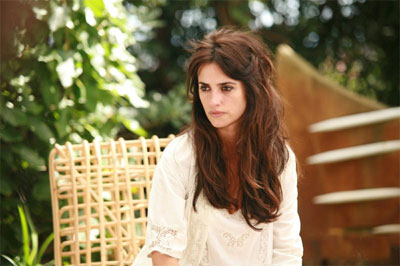 Paul Fischer: I was going to ask if any of the hearts of these characters are something you connect with personally? Also I want to go back to were there fans hanging around when trying to shoot in Barcelona? How did you deal with that?
Paul Fischer: I was going to ask if any of the hearts of these characters are something you connect with personally? Also I want to go back to were there fans hanging around when trying to shoot in Barcelona? How did you deal with that?Woody Allen: Yes, there were huge crowds hanging around. It was no problem at all. They were the most polite, sweet people. They would hang around, they didn't bother us, and before a take if I needed quite I would go like this to them. They would all get very quiet. They were totally cooperative and nice. We had an enormous amount of cooperation from the city in every way. If you look at the end of the picture you see all the credits of people that participated. People were giving us things for nothing left and right. They couldn't have been sweeter. I was able to make the picture and because of all the freebies I could make it for the small budget that I had. I never had a lot of money. I make my pictures for approximately 15 million dollars. Some go to 16 and some will be 14, but that's the ballpark. We were able to make the picture for that, and the picture looks healthy, because we got so much cooperation and free things. The town was great to us. The museum would open up for us. the crowds in the street, which were enormous, it was not like shooting in New York where you get a couple of drifters that watch, and they are jaded, and don't care. We really got hundreds and hundreds of people. They could not have been sweeter or more cooperative.
Paul Fischer: You are in town to direct an opera? What is the difference in directing and will you work with Placido Domingo?
Woody Allen: I didn't want to direct anybody else's material before. I never directed a significant thing in the theatre live. The only live thing I directed were my own little one act plays. I certainly never directed on Opera. I've only been to about 15 of them in my life. Somebody from the board of the LA Opera a friend of mine. He's been bothering me for a long time to direct an opera. Placido Domingo has spoken to me on a number of occasions to direct an opera. I always dodged it or slipped out of it. They said 'Look, this is a one act opera that Puccini wrote you just have to do the third one.' It's a small cast, it's a one hour opera, and it's only about 10 people. No big chorus. They said 'You can do it, and we'll help you.' This was like three years ago and so I said 'Okay.' 'You have to come to LA and do the opera, so tomorrow morning at 9:30 I start. I hope that the Puccini material is strong enough that I won't get hurt. I don't know if I can take that, there is some distance. It's moving personally, but I've got to do it, and I'll give it my best shot. I think it's okay. It's only 55 minutes actually. I timed it and it ran 55 minutes. I have to keep it for 55 minutes. I'm such a novice at it I asked people 'When we rehearse do we sing?' I'm still not sure how that works. So when I direct a scene am I going to have to stop and wait for the guy to sing his whole thing before I move on? I don't know what to expect. We had a wonderful, wonderful set, and I'll give it my best shot. I hope the material is so strong that they won't see the flaws in me.
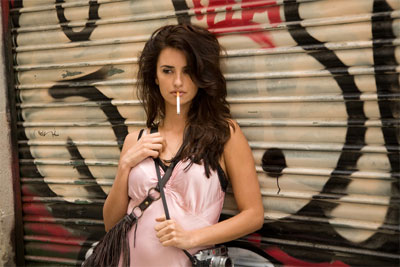 Paul Fischer: This is being called your sexiest movie yet. It seems like in your early movies you never had sex scenes. Can you talk about discovering sex at this point in your life?
Paul Fischer: This is being called your sexiest movie yet. It seems like in your early movies you never had sex scenes. Can you talk about discovering sex at this point in your life?Woody Allen: It's just by chance. Everybody thinks that there is an agenda that I have. Maybe they think its certain psychological turning points in my life. It's not really so. It just so happens that this story requires a certain amount of sensuality. There is a kissing scene, a scene between the two girls that is brief, and there isn't really a lot of sex in the picture. Its nothing really that I've discovered. Whatever is required. I just finished a picture with Larry David, Evan Rachel Wood, and Patricia Clarkson. There is sex in the movie. It's a comedy, a romantic comedy. Its just by chance that the next film I thought of was a musical with sex, or a very sexual picture, or if I have an idea for what I felt was a brilliant pornographic comedy idea. If I had an idea for a family comedy, it's just whatever idea I come up with. These naturally had a little passion in it, but nothing explicit to speak of really. In my hotel I turn on the television set and 'Show Girls' was on TV. Now that was clearly sexual. This one isn't.
Paul Fischer: Were you comfortable directing Scarlett and Javier in that scene? They are making love in bed.
Allen: When they are kissing? Its easy when there are two fabulous performers. They started kissing, and I thought I would be going very, very long to make the scene extra long, beyond what you would think would be long. I wanted to have in and out of focus. They just kissed, and kissed, and kissed. Then when it was over that was it. They went their own way and there was no real they are actors. They get paid. Kissing for a couple of minutes, I watch, and say 'Okay, we'll do it again.' Then it's over and we movie on to the next thing.
Paul Fischer: You said that you have a pessimistic view of love. For a writer and director who is so into the psychology of how people work isn't there a side to you that thinks people change and evolve?
Woody Allen: There is always the possibility that people will change. Real change is more rare. If you are a certain age you are pretty much a variation of that your whole life. It's conceivable that you will change but it's not likely. Rebecca is never comfortable, she's never going to have an affair, and cheat on her husband. She's all nervous and full of anxiety. She changes her clothes a million times, she can't decide if she should kiss him, go to bed with him, should she leave, so some people are not meant for adventure or adultery. There will always be that beautiful girl who all the guys run after and she will get involved with the next poet, or factory worker would be her next action. That won't work out, so she'll get involved with a swimmer, and the list will go on and on. I don't hold high chances for people changing who they are, but again I'm pessimistic. They could be correct and I could be wrong.
Paul Fischer: Which was more challenging? Writing for a different culture or characters from a different generation than yourself?
Woody Allen: What happens is that you get a lot of help from people. I write the thing as best I can, for the generation, or I just wrote it. They play it and when they play it they say 'We would really never say this. We would never go to that nightclub. We don't do this anymore.' They would tell me and I would strike it then ask 'What would you do?' Then I add it and let them do that thing instead. I never think in terms of writing for a culture or for a generation. I just write the story so that it works. When you are doing it you would be amazed how many people chime in with corrections. Everyone from the cameraman to the guy delivering coffee. It could be the actor or actress. All of that helps to focus the thing, so that it works by the time you finish, and it's reasonably accurate.
Paul Fischer: What life lessons did you learn as a little boy that still serve as a strong source of inspiration for you even now?
Woody Allen: I think that the biggest life lesson I learned as a boy that has helped me and is still with me is that you really have to discipline yourself to do the work. If you want to accomplish something you can't spend a lot of time hemming and hawing, putting it off, making excuses for yourself, and figuring ways. You have to actually do it. I have to go home every single day, know where I am, what I'm doing, and including 45 minutes of practice on my Clarinet because I want to play. I have to do it, I want to write, so I get up in the morning, go in and close the door and write. You can't string paper clips, and get your pad ready, and turn your phone off, and get this, get coffee made. You have to do the stuff. Everything in life turns out to be a distraction from the real thing you want to do. There are a million distractions and when I was a kid I was very disciplined. I knew that the other kids weren't. I was the one able to do the thing, not because I had more talent, maybe less, but because they simply weren't applying themselves. As a kid I wanted to do magic tricks. I could sit endlessly in front of mirror, practicing, practicing, because I knew if you wanted to do the tricks you've got to do the thing. I did that with the Clarinet, when I was teaching, I did that with writing. This is the most important thing in my life because I see people striking out all the time. It's not because they don't have talent, or because they don't want to be, but because they don't put the work in to do it. They don't have the discipline to do it. This was something I learned myself. I also had a very strict mother who was no nonsense about that stuff. She said 'If you don't do it, then you aren't going to be able to do the thing.' It's as simple as that. I said this to my daughter, if you don't practice the guitar, when you get older you wouldn't be able to play it. It's that simple. If you want to play the guitar, you put a half hour in everyday, but you have to do it. This has been the biggest guiding principle in my life when I was younger and it stuck. I made the statement that 80 percent of life is showing up. People used to always say to me that they wanted to write a novel, and the couple of people that did it were 80 percent of the way to having something happen. All the other people struck out without ever getting that pack. They couldn't do it, so once you do it, you write your script, or novel, you are more than half way towards something good happening. What I am saying is that it's a life lesson.
Paul Fischer: From working with two Spanish actors in Spain was there anything that you learned from that culture?
Woody Allen: They take themselves very seriously. Javier and Penelope are very serious actors. I always found that amusing, they are so great, and like most serious actors like Robert De Niro, they think they are great because they do all that work. They are born great. They are great when they wake up in the morning. They don't have to do all that work and they would still be great. I never rehearsed with any of the actors. I never talked to them about the plot or anything. I just show up and do it. I get a lot of great performances simply by hiring great people. Javier and Penelope were constantly talking about the plots but not with me. They talked about it with each other. They were rehearsing all the time, their lines, they rehearsed themselves. I found that amusing. They think that's what is making them great. What is making them great is that they just are great. Javier could walk into this room, never having seen anything before, and act the part out. He would be charismatic and mesmerizing. It's just built into him. It's the same with Robert De Niro, or Jack Nicholson. It's just there for a lot of actors. I found that the Spanish actors took it very seriously. They were very formal and serious about the work. I found that amusing myself. In the end it doesn't bother me.
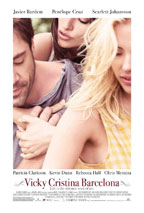
Vicky Cristina Barcelona
Starring: Scarlett Johansson, Penélope Cruz, Rebecca Hall, Javier Bardem, Chris MessinaDirector: Woody Allen
Genre: Comedies
Two young Americans girls Vicky and Cristina spend a summer in Spain and meet a flamboyant artist (Javier Bardem) and his beautiful but insane ex-wife (Penelope Cruz). Vicky (Rebecca Hall) is straight-laced and about to be married. Cristina (Scarlett Johansson) is a sexually adventurous free spirit. When they all become amorously entangled, the results are both hilarious and harrowing.
Vicky Cristina Barcelona Interviews
Scarlett Johansson - www.girl.com.au/scarlett-johansson-vicky-cristina-barcelona-interview.htm
Penelope Cruz - www.femail.com.au/penelope-cruz-vicki-cristina-barcelona-interview.htm
Javier Bardemwww.girl.com.au/javier-bardem-vicki-christina-barcelona-interview.htm
Woody Allen - www.femail.com.au/woody-allen-vicky-cristina-barcelona-interview.htm
MORE
- Viggo Mortensen The Road
- 24 Cast Reunion
- Aaron Eckhardt No Reservations
- Aaron Eckhart The Dark Knight
- Adam McKay Step Brothers Interview
- Alan Alda Diminished Capacity Interview
- Alan Alda Diminished Capacity Interview
- Alex Dimitriades
- Al Pacino Oceans 13
- Alan Rickman Snow Cake
- Alan Rickman Sweeney Todd



